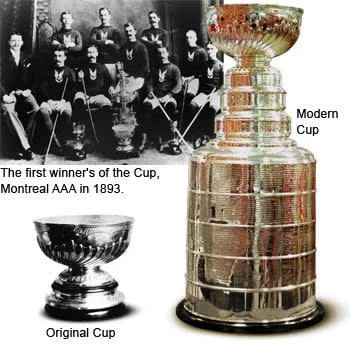Ice Hockey (NHL) - Stanley Cup
Arguably the highest award in the National Hockey League (NHL), the Stanley Cup is often regarded as one of the most recognized and historic professional sports trophies. It embodies excellence in ice hockey, sheer hard work, and dedication, and it is much more than an ordinary trophy, owing to the deep history, intense competition, and great moments that surround it.
History of the Stanley Cup
One can say that the Stanley Cup is more than just a trophy. It is the most difficult trophy to win by an athlete in any sport in North America or the United States. It has been awarded since 1893 and is considered the oldest professional sports trophy in North America. It was first offered by Lord Stanley of Preston, the governor-general of Canada at the time, in order to recognize the best amateur hockey team in the country. As time went on and the interest in professional hockey increased, the Stanley Cup became the ultimate trophy for NHL teams, and this practice is still in place to this day.
The Cup came under the control of the NHL in 1926. The Championships have been awarded every year to the league victor with some exceptions because of labour disputes and wars. Teams jährlich however much more gruelling contend with an 82-game regular season and the back-breaking Stanley Cup Playoffs to earn a prize.
Format of the Stanley Cup Playoffs
In the realm of sports, one of the most difficult and exciting competitions held is that of the postseason Stanley Cup Playoffs. Eight teams qualify from the Eastern Conference and eight from the Western Conference. Each of these teams challenge one another in a best of seven, four round series.
Stanley Cup Playoffs
Every round tests a team’s depth, skill, and stamina. By the time a franchise reaches the Stanley Cup Finals, it is safe to say that they have played at least 16 games against the best of the best. In order to advance, teams must win four games.
The Boston Smythe's cup is also famous for its long-standing celebration traditions. Unlike most sports awards, the stanley cup is not a new trophy that is made every year. In every winning team of the cup, all the players have their names inscribed on the cup which is also called the stanley cup. It contributes to the sense of continuity and preservation that is unique to the cup.
Another unique tradition is the “Day with the Cup” rule. Each player of the winning team is entitled to one day with the Stanley Cup; this however, is often done with friends, relatives, and fans within the player’s home or its vicinity. It has become a common practice for many players to take the Cup out for social gatherings, even to sick wards and back to their home town’s sports centres. This is a way for all the people involved with the sport of hockey to celebrate and share in the glory of the achievement.
Highlights from Stanley Cup History
Hockey fans have experienced some of the most memorable moments in sports history thanks to the Stanley Cup. The Stanley Cup's history is based on decades of heroics, from Bobby Orr's famous, leaping overtime goal in 1970 to Wayne Gretzky's four Stanley Cup wins with the Edmonton Oilers in the 1980s.
More recent events include the first-ever Stanley Cup triumph of the Washington Capitals in 2018, captained by captain Alexander Ovechkin, which was eagerly anticipated by both the team and its supporters. A large portion of the 2010s was also dominated by the Pittsburgh Penguins and Chicago Blackhawks, both of which established dynasties and won numerous titles.
The long and winding road to capture the coveted Cup trophy
Winning the Stanley Cup is almost impossible unlike the prior rounds of playoffs which are obviously harder. Every sport has its own challenges but hockey is fast and can be very physical and winning most times sees teams fighting against fatigue, injuries and psychological pressure. There are amazing players in the history of the NHL who have Hall of Fame careers, such as Marcel Dionne and Eric Lindros, but have never won the Stanley Cup. This goes on to show the difficulty and rarity of getting one’s hands on the coveted trophy.
The National Hockey League imposes salary caps; it is understood that no team will have an easier path towards winning the Cup especially given the current parity in the league. The competition gets stiffer because of the young upcoming talents, coupled with the old guards; in many cases, the teams have to wait for decades for their chances.
Conclusion
The Stanley Cup, above being a trophy for the winning team of the National Hockey League, represents the end of an emotional, physically challenging and year-long campaign. This also serves to the benefit of hockey history as the trophies have an impressive list of teams that have won them, and as a result, their names are inscribed in the trophy which helps in preserving them for eternity. In the case of the fans, nothing surpasses the Stanley Cup in terms of sports trophies, the embodiment of endurance, altruism, and teamwork.
In the realm of professional ice hockey, winning the Stanley Cup and earning a distinction of the best team in the league is without comparison the greatest victory. Indeed, considering its extensive background values and its unique practices, Cup is aptly termed the most prestigious honour of the game.

